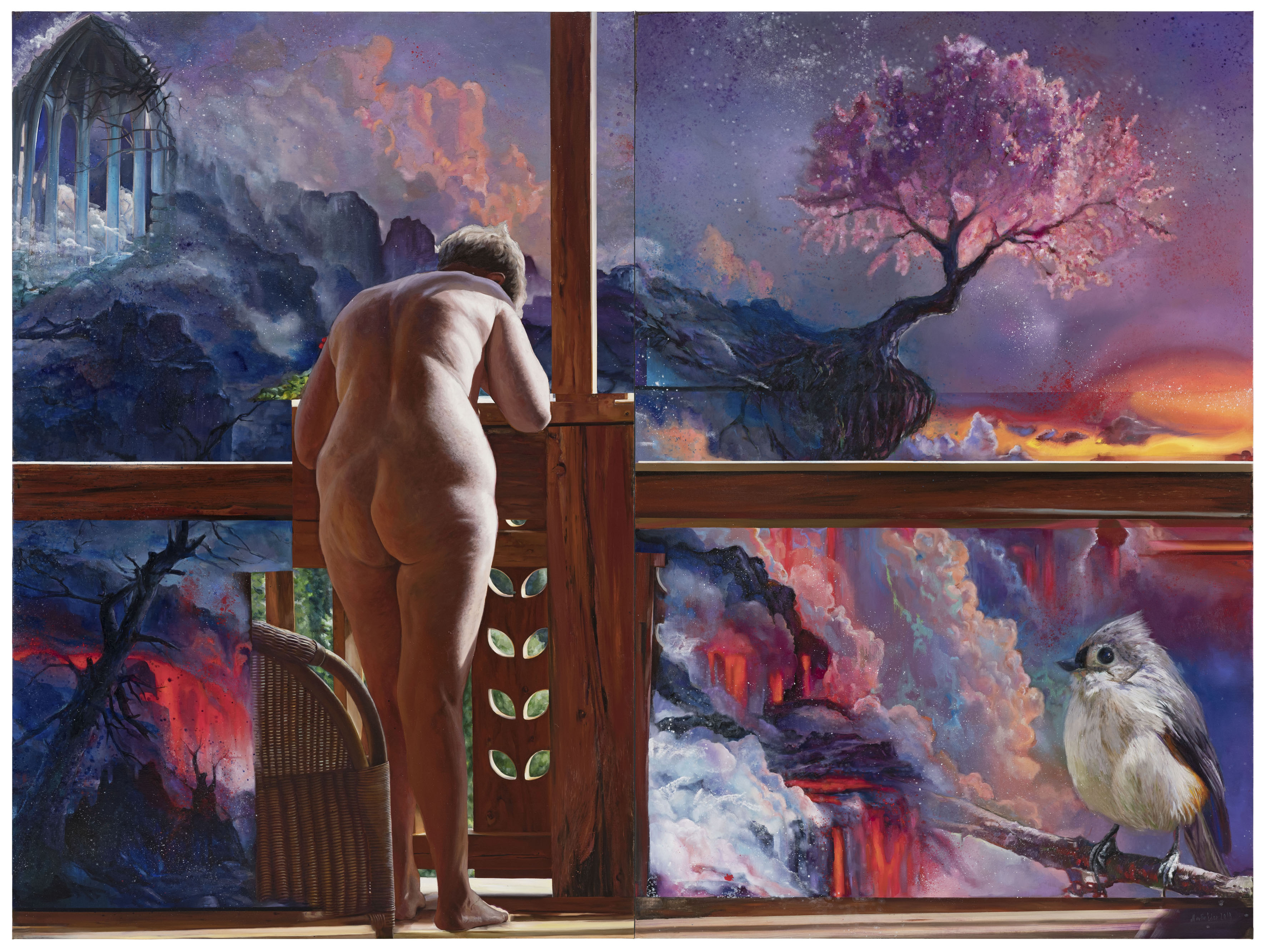
For months, German artist Martin Eder painstakingly combed the internet for images of a painting he made that’s in the collection of Damien Hirst.
The reason is that the work, titled The Unknowable (2018), was at the center of a lawsuit filed by U.K. artist Daniel Conway claiming that Eder plagiarized a part of the painting.
So Eder contacted strangers, persuading users to remove pictures or selfies they had posted with the work, and hid away 3,000 freshly printed books that included the image, all as he awaited a decision. The work was left out of his retrospective.
Now, after three years, a Berlin Regional Court has decided that Eder’s painting doesn’t infringe on the artist’s copyright protections, legally declaring Eder’s work a pastiche that lawfully samples from the original artwork.
It is the first ruling in the European Union of its kind for an artwork, and has been framed as a win for appropriation art.
Martin Eder’s “Phantasma” exhibition at Galerie EIGEN + ART, Leipzig. Photo: Uwe Walter, Berlin
“If I didn’t win, it could become more difficult for artists to quote other artworks,” Eder told me. “We come from a culture of sampling.”
The painting includes a mix of references in Eder’s signature style of vividly kitsch contemporary oil painting that blend the sentimentality of Romanticism with the cheapness of stock or pornographic imagery floating on the internet. The issue with the work The Unknowable was a sampled picture of a cherry tree that Eder purchased from a paint-by-numbers set on Amazon for $12. Eder combined it within a surrealist landscape that includes a copied version of an 1819 painting by Caspar David Friedrich.
The work went on view just once in 2018 at Hirst’s Newport Street Gallery in London, where the U.K. artist shows works from his art collection. It may have been that visibility that got Eder into trouble: shortly after it opened, the Diet Prada Instagram account accused him of stealing another person’s work.
Martin Eder Planetary / Planetarium (2021). Photo: Uwe Walter, Berlin. Courtesy Galerie EIGEN + ART Leipzig/Berlin
The post garnered more than 20,000 likes and the Berlin-based painter said he became the subject of harassment. A lawsuit filed by a U.K. artist who claimed to be the person behind the original image followed.
“I thought I had to fight this fight because it was about the freedom of art,” Eder said. “If you steal something, that is completely different. But within a collage, it gains a different meaning.”
The art of pastiche, which means an artistic work that imitates the style of another (or several), is actually rarely absent from any popular figurative art movement. The Dadaists were among the first in the West to actively borrow from the world around them. Their ideas later found renewed rigor with artists like Sturtevant, who made copies of Modernist icons. More recently, U.S. artist Christine Wang has been creating works that borrow from memes.
Martin Eder’s “Phantasma”
exhibition at Galerie EIGEN + ART, Leipzig. Photo: Uwe Walter, Berlin
Yet there has been a string of notable copyright cases probing the gray areas around such appropriated imagery. Jeff Koons and the Center Pompidou lost a lawsuit in 2021 for reusing an image from a commercial advertisement from a French clothing brand. He now faces a lawsuit for infringement in the use of a sculpture in his “Made in Heaven” series.
The U.S. Supreme Court agreed last week to hear copyright infringement case about Andy Warhol’s silkscreens of the musician Prince, brought to court by the photographer Lynn Goldsmith who had taken the original picture of the rockstar.
Eder, who has been active since the 1980s, has built a devout following, especially among German and other European collectors for his meticulous oil paintings that blend incongruous aesthetics. His work is now the subject of a large retrospective exhibition titled “Moloch” at the Kunstsammlung Museen Augburg that includes more than 50 artworks from private collections (The Unknowable was left out due to the ongoing case).
Eder’s lawyer, Christiane Stüzle, said the court decision in Berlin took into account how digital cultures borrow and remix in a way that extends well beyond fine art. “There must be a way that you don’t pull everyone in front of a court just because they are sending a meme around,” Stüzle said.
Judy Lybke, Eder’s art dealer and founder of the gallery Eigen + Art in Berlin, called the Berlin ruling “an important judgment for artistic freedom.” It is “a verdict up to date,” he added.